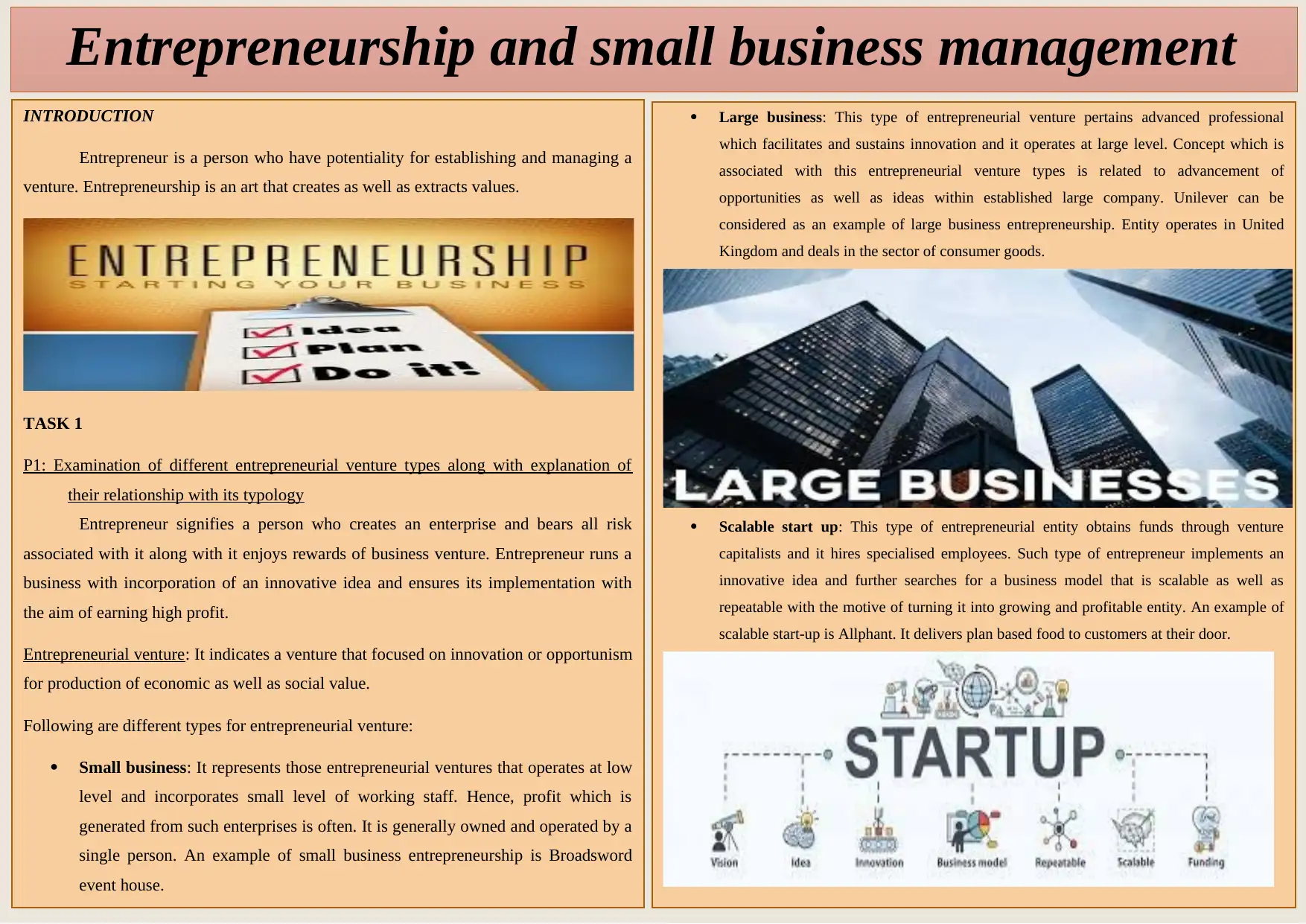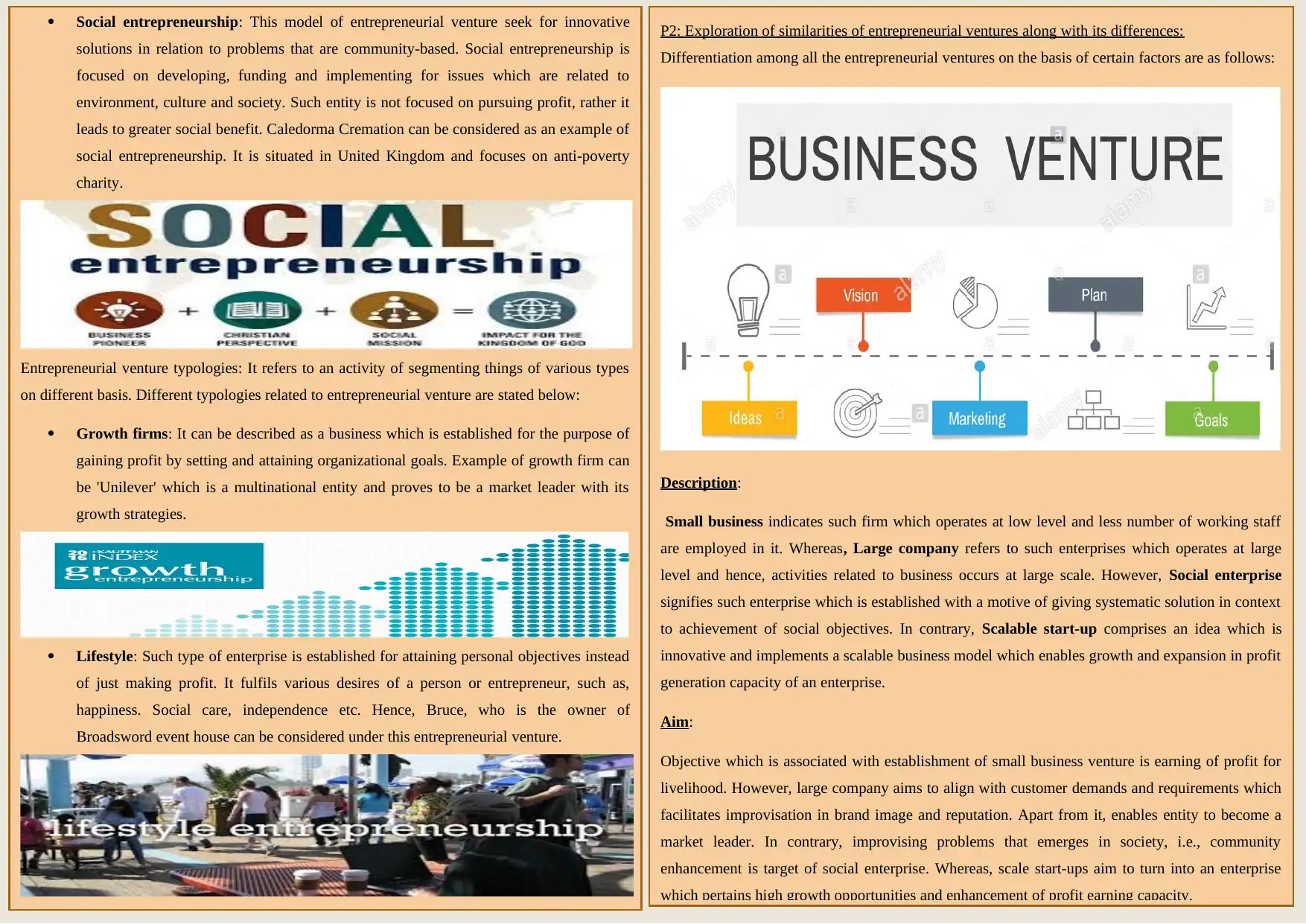Entrepreneurial Ventures: Exploring Types, Scope, and Development
VerifiedAdded on 2023/01/10
|3
|1289
|88
Report
AI Summary
This report provides a comprehensive analysis of various entrepreneurial ventures, including small businesses, scalable startups, social enterprises, and large companies. It examines the characteristics, scope, and growth strategies of each type, highlighting their similarities and differences. The report explores the typologies of entrepreneurial ventures, such as growth firms and lifestyle businesses, and discusses their aims and features. Furthermore, it investigates the development and growth aspects of these ventures, emphasizing the importance of customer loyalty, market recognition, and innovative business models. The report also delves into the application of entrepreneurial ventures in both public and private sectors, providing examples of companies and their entrepreneurial activities. The report concludes with a discussion on the regulatory aspects and administrative oversight within these ventures.

Entrepreneurship and small business management
INTRODUCTION
Entrepreneur is a person who have potentiality for establishing and managing a
venture. Entrepreneurship is an art that creates as well as extracts values.
TASK 1
P1: Examination of different entrepreneurial venture types along with explanation of
their relationship with its typology
Entrepreneur signifies a person who creates an enterprise and bears all risk
associated with it along with it enjoys rewards of business venture. Entrepreneur runs a
business with incorporation of an innovative idea and ensures its implementation with
the aim of earning high profit.
Entrepreneurial venture: It indicates a venture that focused on innovation or opportunism
for production of economic as well as social value.
Following are different types for entrepreneurial venture:
Small business: It represents those entrepreneurial ventures that operates at low
level and incorporates small level of working staff. Hence, profit which is
generated from such enterprises is often. It is generally owned and operated by a
single person. An example of small business entrepreneurship is Broadsword
event house.
Large business: This type of entrepreneurial venture pertains advanced professional
which facilitates and sustains innovation and it operates at large level. Concept which is
associated with this entrepreneurial venture types is related to advancement of
opportunities as well as ideas within established large company. Unilever can be
considered as an example of large business entrepreneurship. Entity operates in United
Kingdom and deals in the sector of consumer goods.
Scalable start up: This type of entrepreneurial entity obtains funds through venture
capitalists and it hires specialised employees. Such type of entrepreneur implements an
innovative idea and further searches for a business model that is scalable as well as
repeatable with the motive of turning it into growing and profitable entity. An example of
scalable start-up is Allphant. It delivers plan based food to customers at their door.
INTRODUCTION
Entrepreneur is a person who have potentiality for establishing and managing a
venture. Entrepreneurship is an art that creates as well as extracts values.
TASK 1
P1: Examination of different entrepreneurial venture types along with explanation of
their relationship with its typology
Entrepreneur signifies a person who creates an enterprise and bears all risk
associated with it along with it enjoys rewards of business venture. Entrepreneur runs a
business with incorporation of an innovative idea and ensures its implementation with
the aim of earning high profit.
Entrepreneurial venture: It indicates a venture that focused on innovation or opportunism
for production of economic as well as social value.
Following are different types for entrepreneurial venture:
Small business: It represents those entrepreneurial ventures that operates at low
level and incorporates small level of working staff. Hence, profit which is
generated from such enterprises is often. It is generally owned and operated by a
single person. An example of small business entrepreneurship is Broadsword
event house.
Large business: This type of entrepreneurial venture pertains advanced professional
which facilitates and sustains innovation and it operates at large level. Concept which is
associated with this entrepreneurial venture types is related to advancement of
opportunities as well as ideas within established large company. Unilever can be
considered as an example of large business entrepreneurship. Entity operates in United
Kingdom and deals in the sector of consumer goods.
Scalable start up: This type of entrepreneurial entity obtains funds through venture
capitalists and it hires specialised employees. Such type of entrepreneur implements an
innovative idea and further searches for a business model that is scalable as well as
repeatable with the motive of turning it into growing and profitable entity. An example of
scalable start-up is Allphant. It delivers plan based food to customers at their door.
Paraphrase This Document
Need a fresh take? Get an instant paraphrase of this document with our AI Paraphraser

Social entrepreneurship: This model of entrepreneurial venture seek for innovative
solutions in relation to problems that are community-based. Social entrepreneurship is
focused on developing, funding and implementing for issues which are related to
environment, culture and society. Such entity is not focused on pursuing profit, rather it
leads to greater social benefit. Caledorma Cremation can be considered as an example of
social entrepreneurship. It is situated in United Kingdom and focuses on anti-poverty
charity.
Entrepreneurial venture typologies: It refers to an activity of segmenting things of various types
on different basis. Different typologies related to entrepreneurial venture are stated below:
Growth firms: It can be described as a business which is established for the purpose of
gaining profit by setting and attaining organizational goals. Example of growth firm can
be 'Unilever' which is a multinational entity and proves to be a market leader with its
growth strategies.
Lifestyle: Such type of enterprise is established for attaining personal objectives instead
of just making profit. It fulfils various desires of a person or entrepreneur, such as,
happiness. Social care, independence etc. Hence, Bruce, who is the owner of
Broadsword event house can be considered under this entrepreneurial venture.
P2: Exploration of similarities of entrepreneurial ventures along with its differences:
Differentiation among all the entrepreneurial ventures on the basis of certain factors are as follows:
Description:
Small business indicates such firm which operates at low level and less number of working staff
are employed in it. Whereas, Large company refers to such enterprises which operates at large
level and hence, activities related to business occurs at large scale. However, Social enterprise
signifies such enterprise which is established with a motive of giving systematic solution in context
to achievement of social objectives. In contrary, Scalable start-up comprises an idea which is
innovative and implements a scalable business model which enables growth and expansion in profit
generation capacity of an enterprise.
Aim:
Objective which is associated with establishment of small business venture is earning of profit for
livelihood. However, large company aims to align with customer demands and requirements which
facilitates improvisation in brand image and reputation. Apart from it, enables entity to become a
market leader. In contrary, improvising problems that emerges in society, i.e., community
enhancement is target of social enterprise. Whereas, scale start-ups aim to turn into an enterprise
which pertains high growth opportunities and enhancement of profit earning capacity.
solutions in relation to problems that are community-based. Social entrepreneurship is
focused on developing, funding and implementing for issues which are related to
environment, culture and society. Such entity is not focused on pursuing profit, rather it
leads to greater social benefit. Caledorma Cremation can be considered as an example of
social entrepreneurship. It is situated in United Kingdom and focuses on anti-poverty
charity.
Entrepreneurial venture typologies: It refers to an activity of segmenting things of various types
on different basis. Different typologies related to entrepreneurial venture are stated below:
Growth firms: It can be described as a business which is established for the purpose of
gaining profit by setting and attaining organizational goals. Example of growth firm can
be 'Unilever' which is a multinational entity and proves to be a market leader with its
growth strategies.
Lifestyle: Such type of enterprise is established for attaining personal objectives instead
of just making profit. It fulfils various desires of a person or entrepreneur, such as,
happiness. Social care, independence etc. Hence, Bruce, who is the owner of
Broadsword event house can be considered under this entrepreneurial venture.
P2: Exploration of similarities of entrepreneurial ventures along with its differences:
Differentiation among all the entrepreneurial ventures on the basis of certain factors are as follows:
Description:
Small business indicates such firm which operates at low level and less number of working staff
are employed in it. Whereas, Large company refers to such enterprises which operates at large
level and hence, activities related to business occurs at large scale. However, Social enterprise
signifies such enterprise which is established with a motive of giving systematic solution in context
to achievement of social objectives. In contrary, Scalable start-up comprises an idea which is
innovative and implements a scalable business model which enables growth and expansion in profit
generation capacity of an enterprise.
Aim:
Objective which is associated with establishment of small business venture is earning of profit for
livelihood. However, large company aims to align with customer demands and requirements which
facilitates improvisation in brand image and reputation. Apart from it, enables entity to become a
market leader. In contrary, improvising problems that emerges in society, i.e., community
enhancement is target of social enterprise. Whereas, scale start-ups aim to turn into an enterprise
which pertains high growth opportunities and enhancement of profit earning capacity.

D1: Critical examination of scope, development as well as growth in context to entrepreneurial
venture:
Small business entrepreneurial venture:
Scope: Scope of small business is that such firms can collaborate with large organizations. It
enables enhancement of productivity and profitability of business.
Growth and Development: Creating a loyalty program for customers and aligning with their
demands and expectation provides opportunity to small organizations to enhance its grow and
develop in market.
Large company entrepreneurial venture:
Scope: Large organizations pertains scope of enhancing market recognition by expanding business
to untapped areas.
Growth and Development: This entrepreneurial venture can further grow and expand its
operations by focusing on requirements of customers. It leads to enhancement in satisfaction level
of customers and improvising brand image of an organization in market.
Scalable start-up entrepreneurial venture
Scope: Identification of gap between expectations of customers and market supplies. This proves to
be an opportunity or scope to scalable start-ups to provide innovative solutions and earn high
profitability.
Growth and Development: Attracting potential investors with help of effective and innovative
business model enables growth and development of scalable start-ups.
To assess the enforced regulation and dominant
administration: This is a proactive measure of
monitoring and review. As there should be proper
and regular checking of implemented standards in
organisation.
Features:
Small businesses are characterised as pertains lower capacity of revenue generation. Further,
small level of workforce is appointed in such firm. Whereas, large company incorporates complex
hierarchy of management as number of people employed is high. However, Social enterprise
associates clear mission for society and community. Although, Scalable start-up is focused on
gaining high sustainability in longer run through application of efficiency innovative solutions,
which increases efficiency of business and helps in attracting large level of investors.
Following are some similarities associated with different types of ventures which are
entrepreneurial:
All entrepreneurial venture incorporates risk taking feature.
Focus of all type of entrepreneurial business is on enhancement of sales.
Further, customer retention is motive of all such enterprises as it reduces costs
incorporated with attracting new customers.
Improvement in customer's satisfaction level is the focus point of every type of
organizations.
M1: Investigation of diverse range for entrepreneurial venture for demonstrating and
understanding entrepreneurship in public as well as corporate sectors:
Entrepreneurial venture serves in both public as well as private sectors.
Social enterprise can be considered in the category of public enterprise, whereas, large company,
small businesses, and scalable start-ups are considered as a private sector entity. There are several
public sector entrepreneurial ventures such as, HSBC, Royal Dutch Shell, Boohoo, etc. Apart
from it, Swire, Dyson, EMR, JCB etc. serves as an example of private sector companies.
venture:
Small business entrepreneurial venture:
Scope: Scope of small business is that such firms can collaborate with large organizations. It
enables enhancement of productivity and profitability of business.
Growth and Development: Creating a loyalty program for customers and aligning with their
demands and expectation provides opportunity to small organizations to enhance its grow and
develop in market.
Large company entrepreneurial venture:
Scope: Large organizations pertains scope of enhancing market recognition by expanding business
to untapped areas.
Growth and Development: This entrepreneurial venture can further grow and expand its
operations by focusing on requirements of customers. It leads to enhancement in satisfaction level
of customers and improvising brand image of an organization in market.
Scalable start-up entrepreneurial venture
Scope: Identification of gap between expectations of customers and market supplies. This proves to
be an opportunity or scope to scalable start-ups to provide innovative solutions and earn high
profitability.
Growth and Development: Attracting potential investors with help of effective and innovative
business model enables growth and development of scalable start-ups.
To assess the enforced regulation and dominant
administration: This is a proactive measure of
monitoring and review. As there should be proper
and regular checking of implemented standards in
organisation.
Features:
Small businesses are characterised as pertains lower capacity of revenue generation. Further,
small level of workforce is appointed in such firm. Whereas, large company incorporates complex
hierarchy of management as number of people employed is high. However, Social enterprise
associates clear mission for society and community. Although, Scalable start-up is focused on
gaining high sustainability in longer run through application of efficiency innovative solutions,
which increases efficiency of business and helps in attracting large level of investors.
Following are some similarities associated with different types of ventures which are
entrepreneurial:
All entrepreneurial venture incorporates risk taking feature.
Focus of all type of entrepreneurial business is on enhancement of sales.
Further, customer retention is motive of all such enterprises as it reduces costs
incorporated with attracting new customers.
Improvement in customer's satisfaction level is the focus point of every type of
organizations.
M1: Investigation of diverse range for entrepreneurial venture for demonstrating and
understanding entrepreneurship in public as well as corporate sectors:
Entrepreneurial venture serves in both public as well as private sectors.
Social enterprise can be considered in the category of public enterprise, whereas, large company,
small businesses, and scalable start-ups are considered as a private sector entity. There are several
public sector entrepreneurial ventures such as, HSBC, Royal Dutch Shell, Boohoo, etc. Apart
from it, Swire, Dyson, EMR, JCB etc. serves as an example of private sector companies.
⊘ This is a preview!⊘
Do you want full access?
Subscribe today to unlock all pages.

Trusted by 1+ million students worldwide
1 out of 3
Related Documents
Your All-in-One AI-Powered Toolkit for Academic Success.
+13062052269
info@desklib.com
Available 24*7 on WhatsApp / Email
![[object Object]](/_next/static/media/star-bottom.7253800d.svg)
Unlock your academic potential
Copyright © 2020–2026 A2Z Services. All Rights Reserved. Developed and managed by ZUCOL.



